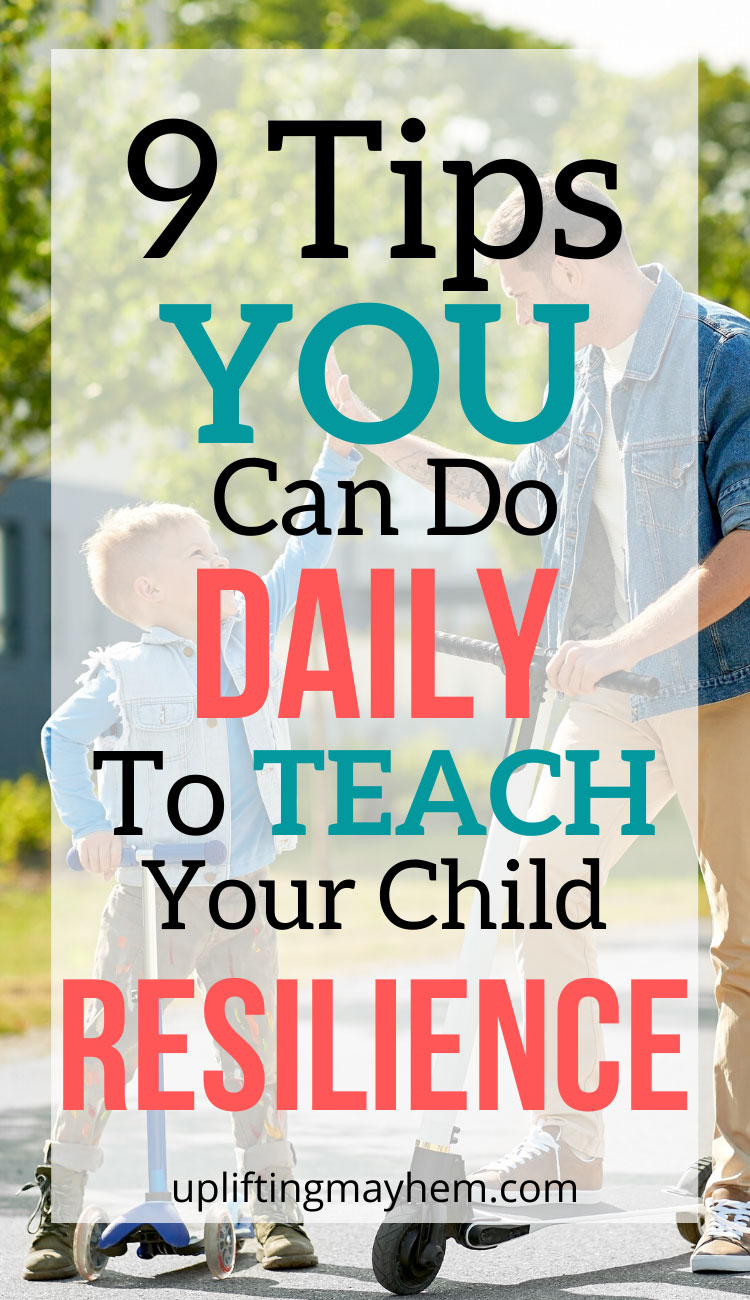I was first introduced in teaching resilience to kids last year when I heard a keynote speaker, Christian Moore, talk with great passion on this subject. I left that class inspired and excited to read more from his book, THE RESILIENCE BREAKTHROUGH, and learn more about resilience.
What is resilience? Resilience by definition is a materials ability to resume shape or position after being bent stretched and compressed. So in short, resilience in life is the ability to bounce back after adversity hits.
The great thing about teaching resilience to kids is that resilience can be taught and learned at any age and become stronger. It is having the ability to “flip the switch” when something bad happens, and then use that negative energy to drive you to something better. It’s never giving up.

Example of resilience:
The other day we went on a 4 wheeler ride and my two oldest rode their motorcycles ahead of us. This trail was challenging and rocky. My son’s bike stalled many times and I watched him get so upset and start punching his bike many times. He became more frustrated and angry as we continued up this difficult trail. After his bike stalled again, he finally left it on the side of the trail and gave up and hopped on with us.
As we continued forward he realized he had almost made it to the top. I wonder if he wished he had just kept going instead of allowing his frustrations to take over. As we returned down the trail and came up to the bike, I was worried he was going to say he was done and my husband would have to ride it down.
I watched him walk over to his bike, start it, and with a little help got it on the trail again. He road over the rocky difficult trail all the way home. When we got back I looked at his face and could see the satisfaction written all over his face. He had just accomplished something hard. That day my son became more resilient. He flipped the switch and took the challenge and conquered it!
Now that you know what resilience is and an example of how it works in your life, I want to share with you ways that you can teach your own children to be resilient! First here are 3 things resilient children see in the world.
Resilient children see that life is challenging and is always changing!
They see these challenges and changes as ways to grow and make a difference in this world. My husband’s favorite quote is, “if you always do what you always have done, you will always get what you always got” (Henry Ford). Change and challenges are good and are full of growth!
Resilient children see mistakes and weaknesses as opportunities to learn!
It is so easy to get caught in the world of perfectionism. In reality, perfectionism only hinders your progress. You have to make mistakes to learn, you have to try new things. You will mess up!
Resilient children know that losing may come before winning.
We all lose sometimes! Many of us most of the time. HA HA! Be ok with losing.
Now I want to share with you 9 ways YOU can start helping your children learn resilience. Resilience isn’t something you are born with, it is something you can learn, which is GREAT news!
Here are 9 things you can start doing today to start teaching resilience to kids.
#1 – Pray to understand your child’s strengths & how to help them with their weaknesses.
I LOVE this so much! Instead of praying that your child will change, and will stop doing whatever it is that is annoying or worrying you, you pray to understand your child’s strengths and how to help make their weaknesses strong. This is something you can do as a mother and provides fantastic results!
#2 – Be patient and realize your child needs time to develop resilience.
Oh man! How many times are we told to be patient with our kids! Heavenly Father knew what he was doing making us mothers. He knew we would learn so much by raising children and motherhood is definitely something that teaches patience. Resilience isn’t going to be learned overnight and will learn a lot by watching you. It becomes a part of your lifestyle.
#3 – Strive to understand that mistakes and failures are great opportunities to learn and grow
Just like a mentioned above, mistakes teach you something. Failures teach you what not to do in the future. Start teaching your child that you only fail when you stop trying! Messing up is a part of life, and it is what you do when you keep going that determines the type of person you become.
#4 – Allow natural logical consequences
When your child messes up (and they will) create a consequence that fits the mistake. Here is an example that we use in our home. Whenever my kids are fighting over a toy and lots of yelling, screaming and crying are going on, I give them 5 minutes to work it out. If they haven’t worked it out in 5 minutes, then I take that specific toy away.
Today my kids were squirting each other with water all over my kitchen…the consequence wasn’t sitting in timeout, it was getting a rag and cleaning the floor, walls, cupboards, and chairs that got in the way of their water war.
#5 – Respect your children’s decisions (even if their poor choices get privileges taken away)
My husband went on a business trip one time and he had an Italian sitting by him on the airplane. During the conversation our boys came up in the conversation. As my husband shared a story of my boys being stinkers the Italian laughed and said, “Little boys, little problems…..Big boys, Big problems!!” HA HA
I still laugh when I hear this because it is true. Let your kids make choices when they are young, even if they are poor. Help them learn young that there are consequences to their choices. Whether it’s a good or bad consequence, there is always one. Let them learn young and respect their choices.
#6 – Refrain from berating you kids when they break the rules.
This is so hard at times!! You want your child to be perfect! You want them to obey! However this is not why we are sent to this earth! When your kid messes up, love them, talk with them and provide a logical natural consequence. Don’t yell at them, and get on them for breaking a rule! Instead, be a guide and hold their hand through this process of learning.
#7 – Don’t discourage effort
If your child is trying, they haven’t failed. If they fell a little short of your expectations then pick them up and guide them more. Discouraging their effort will only make them try less. They will soon give up trying and not look at you as a trusted person they can turn to which leads to
#8 – Praise and encourage effort
This is so important in your child’s life! When your child accomplishes something great, refrain from praising the accomplishment, but focus on the effort it took to get there. Point out the hard things they did to get to that point. Help them understand that hard work takes you places. If you are to gain anything of great worth, it often requires a lot of work.
#9 – Praise your child more that you correct them.
Many of us have heard to say 5 good things to every 1 bad or corrective thing to your child. You are your child’s ally! Be that safe person for your child and always uplift and see the strengths in your child. Pray to see those strengths as we talked about in number 1. You are the perfect parent for your child because he is your child!
As a parent there are many things that are out of your control. Your children have their free agency and will make choices that you don’t like. Instead of focusing on things that you have not control, focus on what you can do! These 9 tips are all things you can do daily with your children to help them become more resilient, so when they make a mistake they can learn and move forward to a better and more productive life.
Missed last weeks podcast? You can find it here and learn about how to have a futuristic approach to life!

